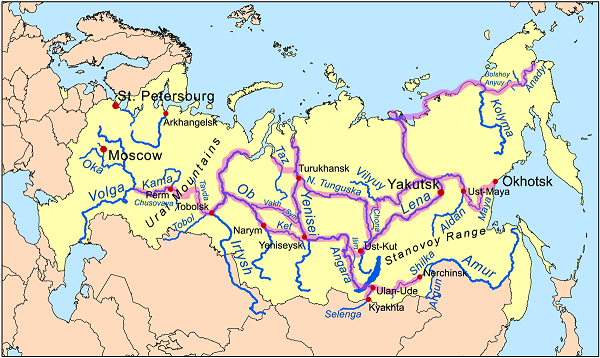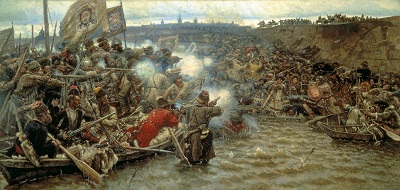After taking Tarkhan, the Cossacks entered the country of the Ostiaks and their prince Samar.
Continuing The Cossacks Conquer Siberia,
our selection from History of the Russian State by Nikolay M. Karamzin published in 1826. The selection is presented in six easy 5 minute installments.
Previously in The Cossacks Conquer Siberia.
Time: 1581
Place: Siberia

CC BY-SA 3.0 image from Wikipedia.
After reducing the cantons of Tarkhan to submission, the Cossacks entered the country of the most considerable of the Ostiak princes, named Samar. Allied with eight hundred other little princes, he was waiting for the Russians with firmness, in order to decide, by a battle, the lot of all the ancient country of Yugorie. Samar boasted of his courage and of his strength, but he forgot prudence, for he, his army and his guards, were plunged in sleep when at the hour of dawn the Cossacks attacked his camp. Awakened by the tumult, he rose, seized his arms, and fell, shot to death at the first volley. In an instant his troops dispersed, and the inhabitants agreed to pay tribute to Russia. Already Yermak had reached the shore of the Obi, an important river, concerning the course of which the ancient Novgorodians had some notions, but whose source and mouth, according to the Muscovite travellers of 1567, were hidden in unknown regions. Master of Nazym, principal town of the Ostiaks, and of many other fortresses, having in his power the Prince of Siberia, Yermak had to deplore the loss of one of his brave companions-in-arms, the hetman Necetas Pan, killed in an assault with some of the most intrepid Cossacks.
He did not desire to penetrate farther into a country which only presented frozen deserts to him, places of desolation where during the summer the burning rays of the sun hardly warmed the surface of immense marshes covered with moss, and where bogs, hardened by the frost and strewed with the bones of mammoths, presented the aspect of a vast cemetery. Yermak appointed Alatscha, an Ostiak prince, as chief of the tribes of the Obi. Then he again took the road of the capital of Siberia, treated as a conqueror and a sovereign by his tributaries. He was received everywhere with demonstrations of absolute submission, as a redoubtable warrior endowed with a supernatural strength of soul. To the sound of warlike music, the Cossacks ascended the rivers. They disembarked clad in their finest raiment in order to astonish the inhabitants by their riches. Having thus assured the domination of Russia from Berezoff to Tobol, Yermak, satisfied and tranquil, arrived safely at Isker.
Then only he announced to the Stroganoffs that with the aid of God he had been able to conquer the Sultan, had taken his capital, his states, his nephew, and had made his people take the oath of allegiance to Russia. At the same time he wrote to the Czar that his poor Cossacks, proscribed, troubled in conscience and given up to repentance, had braved death to reunite a vast state to Russia, in the name of Christ and of their great monarch, for ages upon ages and for as long a time as it might please God to prolong the existence of the universe. “They awaited,” he added, “the orders of the Russian waywodes, to whom they were ready to deliver over the kingdom of Siberia, without any sort of condition, disposed to die for glory or upon a scaffold, according as it should please God and their master.” Charged with this missive, the second of the leaders, John Koltzo, first companion of Yermak in the combats and in the councils, departed for Moscow, where he had been condemned to severe punishment as a state criminal, without fearing the solemn decree which threatened his life.
Here we anticipate a question which seems natural enough. In announcing so late his successes to the Stroganoffs, did not Yermak, influenced by the easy conquest of Siberia, think, as some historians suppose, of reigning independently over that country? Although conqueror, his forces were diminishing every day, and was not the need of aid the only and true motive for his bearing toward Ivan? But how can it be imagined that this prudent leader should not have foreseen, at the beginning of his expedition, that a handful of rash men, abandoned by Russia, would in three or four years have been annihilated by battles or diseases; that in a rigorous climate they would succumb amid deserts and thick forests, impenetrable refuges of a savage and fierce population, whom fire-arms only could force to pay tribute to strangers? It is more probable that, not having been an eye-witness of the facts, the annalist established upon hypothesis the order in which they succeeded each other. Perhaps Yermak feared to boast too soon of his success, desiring, above all, to achieve the conquest of Siberia, which he thought he had done in driving Kutchum into the deserts and in establishing the limits of the Muscovite empire on the banks of the Obi.

Public domain image from Wikipedia.
Transported with joy at the news they had just received from the hetmans, the Stroganoffs set out at once for Moscow, eager to communicate to the Czar all the details of this glorious enterprise. They urged him to finish the reduction of Siberia, simple private citizens like themselves not possessing the means to preserve so vast a conquest. The envoys of Yermak, John Koltzo and his companions, also appeared before the Prince to offer him the realm of Siberia, as well as the precious furs of sables, black foxes, and castors.
These were, since a long time, the first transports of joy in gloomy Moscow. The Czar and the nation seemed to wake up. At court, on the great square, was repeated with intoxication, “God has sent a new empire to Russia!” Bells were rung, solemn thanks were returned to heaven, as at the epoch of Kazan and of Astrakhan, the happy time of the Czar’s youth! Rumor exaggerated the glory of this conquest.
There was no talk but of huge armies destroyed by the Cossacks, of a great number of peoples subjected by their valor, of the immense riches which they had found. In a word, Siberia seemed to have fallen from the sky for the Russians, and, to set off still further Yermak’s success, it was forgotten that from time immemorial this country had been known to the Russians. The disgrace of the Cossacks gave place to honors. John Koltzo, bowing his head in humility before the Czar and the boyars, heard nothing but expressions of good-will, and of praise for his conduct and the name of valiant warrior. Greatly moved, he kissed the hand of the Czar, who caused to be given to him, as well as to the other envoys of Siberia, silver, cloth, and stuffs of value. Ivan immediately sent to Yermak Prince Simeon Bolkovsky and the officer John Glukoff with five hundred strelitz (infantry). He authorized John Koltzo to raise volunteers to go and establish himself in the new countries of Tobol, and ordered the Bishop of Vologda to send ten priests thither for the purpose of celebrating divine service. Prince Bolkovsky was ordered to take, in the spring, the boats of the Stroganoffs and embark on the Tchusovaya (river), to follow the traces of the hero of Siberia. These illustrious citizens, the real authors of this important acquisition to Russia, yielded it to the state. But in recompense, and as a reward for their services and their zeal, Ivan made to Simeon Bolkovsky a concession of two borough towns, the Great and Little Sol, on the Volga. Maxime and Necetas obtained the privilege of carrying on commerce in all their cities without paying any tax or duty.
| <—Previous | Master List | Next—> |
More information here.

Like!! Thank you for publishing this awesome article.